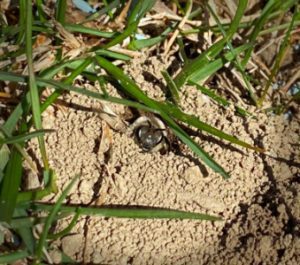Bees That Nest in Lawns Are Docile
By Chris Williams on March 5, 2012.
Q. Last spring we had a whole bunch of what looked like tiny honey bees nesting in our front lawn. There were lots of little mounds with holes in the top and bees flitting around but they were only there for a few weeks. Do you know what they are? If they show up again this spring, I don’t want to hurt them if they’re honey bees.
A. They’re not honey bees but they are beneficial bees all the same. There are several different bees that nest in individual holes in the ground. Entomologists call them “solitary” bees because each hole usually belongs to a single bee, but dozens or even hundreds of bees will nest in the same area making it look like there’s an entire colony. Digger bees are one of the most common solitary bees that nest in lawns. Others are sweat bees, mason bees, and leafcutter bees. Solitary bees are sometimes referred to as the “other bees,” since they are often overlooked while honey bees get most of the publicity. Solitary bees visit flowering plants and are important pollinators, even more so now that honey bees are declining. 
Ground-nesting solitary bees prefer dry soils with little inorganic matter and with morning sun exposure. They dig burrows in areas of bare ground or where there is little vegetation. They avoid damp soils. The female bee provisions her nest with balls of pollen and nectar and lays an egg in each of several cells in March, April, or May. The newly hatched larvae remain in the ground nest, feeding on the pollen, until they emerge the following spring. Bee activity at the burrows lasts only 4 to 6 weeks.
Don’t Confuse These Bees with Yellowjackets
Yellowjackets also nest in the ground. One difference is that yellowjackets are social wasps (not bees) that nest together, and many yellowjackets will be seen entering and leaving the same hole in the ground. Yellowjackets are larger, with brighter yellow and black coloration, and can be aggressive. Their nests often do require professional control.
What Can You Do About Lawn-Nesting Bees?
Ground-nesting bees are important pollinators and control should be avoided if possible. Damage to the lawn is usually minimal and control is only needed if the bees are in a high traffic area and may be seen as a threat to children or pets. However, the bees are quite docile and usually sting only if they are stepped on by accident. Although their numbers may look impressive, they will not join together to attack people like honey bees or yellowjackets. Even mowing does not usually disturb them.
Watering with a lawn sprinkler can sometimes discourage nesting behavior. But for long-term, permanent control you need to eliminate the bare ground or sparse lawn that the bees like for nest sites by growing thicker grass. If the area will not grow a thick lawn, ground cover plants or heavy mulches may be an alternative solution.